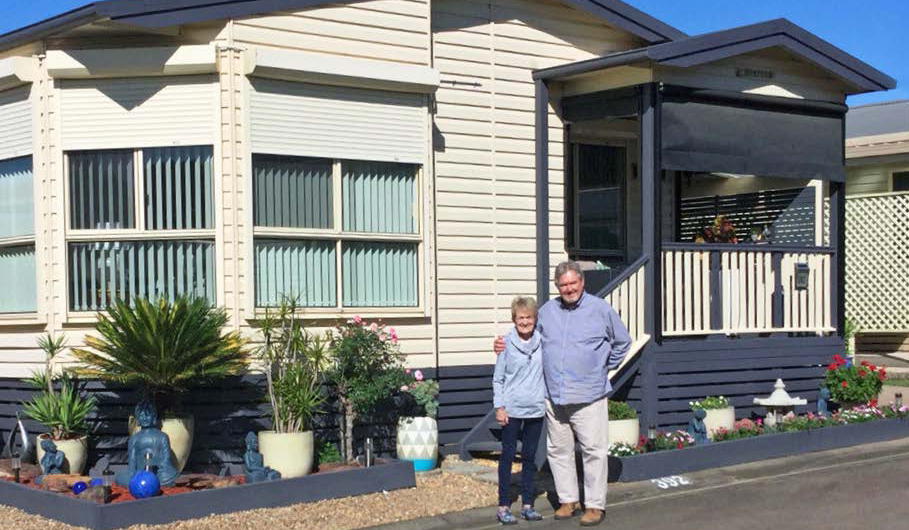Fair market value
01/09/2020
This article is not about home sales, although that is what gives rise to the issue, it’s about site fees and site fee increases. Fair market value appears in sections 109 and 111 of the Residential (Land Lease) Communities Act 2013 (RLLC Act) and is a small but important provision that sets an upper limit on site fees in new site agreements when a home has been sold by one home owner to another.
Fair market value is the higher of either the site fees payable by the home owner who is selling the home, or the site fees payable for residential sites of a similar size and location within the community. It seems very straightforward, but in reality the provision has been ineffective and site fees are often set much higher than fair market value. Over time this practice lifts the site fees in a community to higher and higher levels, yet there is no scrutiny over these increases.
The Tenants’ Union has been concerned about the fair market value provisions since the Residential (Land Lease) Communities Bill was drafted. Unfortunately, since the Act commenced our fears have been realised and the problem we anticipated has become very real and very common. We have written articles about fair market value and we have raised it with government. We have also supported home owners to take disputes to the NSW Civil and Administrative Tribunal (NCAT).
In 2017 a home owner did take her dispute to NCAT when her site fees were set $43.00 per week above fair market value. The matter was settled, her site fees were reduced and she received a refund of almost $3,000 in overpaid site fees. As far as we are aware, no other home owner has taken a s109 dispute to the Tribunal until recently.
Ian Finlayson is an advocate with the Port Stephens and Affiliated Park Residents Association. He lives at Myrtle Glen and assists home owners to sell their homes when they want to move on. Ian started to take notice of the site fees in new site agreements given to purchasers and it became clear site fees were not being set at fair market value. One new home owner, Philomena Tait, purchased a home from a home owner who was paying $183 per week. The site fees in the site agreement given to Philomena by the operator were $201 a week. When this was raised with the operator their response was that $201 was fair market value.

Philomena said “I love my home, neighbours and our village. When I was getting ready to purchase my home I expected to be paying the same or slightly more than the previous owner. I was shocked when the park operators put the site fees up 9.8% considering all my neighbours’ site fees were far less than mine. By then, I had already sold my home and was committed to the move.”
Philomena was prepared to stand up for her rights and Ian assisted her to make an application to the Tribunal. He also represented her at the hearing. Ian presented evidence to the Tribunal that site fees for sites of a similar size and location within the community ranged between $183 and $189 per week.
The operator presented evidence of only one site in the community with site fees of $201 per week, the amount they claimed was fair market value. The operator argued that the correct consideration for setting new site fees was market value, which enables the operator to increase the site fees in a new site agreement to any level the purchaser is willing to accept. The Tribunal rejected that argument and said it did not agree the intention of the legislators when they drafted section 109 was to allow the park operator to negotiate a new site fee only fettered by fair market value as proposed by the operator.
The Tribunal referenced principles of statutory interpretation which say that any particular section of an Act is to be read in context of the part of the Act in which it falls overall, and objectives of the Act in entirety. The Tribunal noted that “any purchaser of a home is motivated by the fact they may pay site fees at the same rate paid by the vendor. Such a purchaser is in a vulnerable position in negotiations with the operator if the operator has an unfettered right to increase site fees.”
The imbalance of power noted by the Tribunal is the reason section 109 is such an important provision. Without the protection section 109 is meant to provide, new home owners have to pay whatever an operator demands or withdraw from the sale and look for a home elsewhere.
In ‘Tait’ the Tribunal went on to consider Part 10 of the Act more broadly and referred to the duty of an operator not to cause or permit any interference with, or any attempt to interfere with a home owner’s right to sell a home. The Tribunal said that it is obvious “the value of the home is highly impacted by the nature of the site agreement for the new resident. If the operator could increase the site fee markedly for the new owner beyond the confines of section 109 that would impact on the old owner’s ability to sell the home.”
The Tribunal found that fair market value in Philomena Tait’s case was a site fee of $189 per week.

However, that was not the end of the matter. The operator appealed the decision of the Tribunal, again challenging the meaning of fair market value. At the hearing the two-member Appeal Panel asked a number of questions before suggesting the parties consider coming to an agreement. The operator consented to accept the original decision of the Tribunal that the site fees would commence at $189 per week. This was a positive outcome for Philomena Tait, and for all new and prospective home owners.
Ian Finlayson told us “This is the fourth section 109 application I have done and if the intention of the original drafters of the legislation was made clearer none of these applications would have been necessary.”
In the review of the RLLC Act later this year the Tenants’ Union will be pressing for an amendment to sections 109 and 111. Fair market value should be whatever the selling home owner is paying – that is the amount determined either by agreement between the parties or by the Tribunal the last time site fees were increased. Any site fee increase at the point of entering into a site agreement is both opportunistic, and unfair.
This article was originally published in Outasite magazine, issue 6, August 2020.
